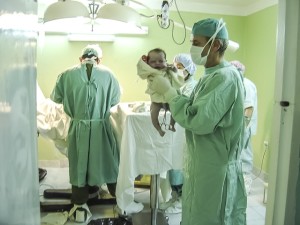 Between October 2014 and January 2015, Doctors Without Borders established a new maternity center at a hospital in Dasht-e-Barchi, an underserved area of Afghanistan’s capital city, Kabul. The new center offers free neonatal intensive care and contains a “kangaroo care” unit, which promotes direct contact between mother and newborn as part of the treatment for babies born with complications. The creation of the maternity center, undertaken in cooperation with the Afghan Ministry of Health, provides complimentary care for many families who would otherwise go without it. The center provides care for babies born prematurely or at low birth weights, and infants with fevers, respiratory infections, and other life-threatening complications.
Between October 2014 and January 2015, Doctors Without Borders established a new maternity center at a hospital in Dasht-e-Barchi, an underserved area of Afghanistan’s capital city, Kabul. The new center offers free neonatal intensive care and contains a “kangaroo care” unit, which promotes direct contact between mother and newborn as part of the treatment for babies born with complications. The creation of the maternity center, undertaken in cooperation with the Afghan Ministry of Health, provides complimentary care for many families who would otherwise go without it. The center provides care for babies born prematurely or at low birth weights, and infants with fevers, respiratory infections, and other life-threatening complications.
More than half of Afghan women typically give birth at home, rather than in a hospital. This tradition stems from both cultural norms and the high cost of maternity care. A definite need exists for greater access to care, especially when complications arise during labor and delivery. Doctors Without Borders is dedicated not just to creating new medical facilities to fulfill this need, but also to training local staff in simple, effective techniques for handling common complications. One example of this effort is the kangaroo care unit, which allows mothers to hold their newborns on their chests, skin to skin, for long periods of time. This simple technique provides warmth, allows the baby to breastfeed, and can calm the baby as he or she can hear the soothing sounds of the mother’s heartbeat and voice. Kangaroo care is used to help encourage growth in premature infants or those who have shown intrauterine growth retardation.
The maternity unit at the Dasht-e-Barchi hospital has 42 beds, 10 of which are reserved for neonatal intensive care and five of which belong to the kangaroo care unit. The team assembled at the hospital includes midwives, surgical nurses, gynecologists, pediatricians, and anesthesia professionals. The staff consists of only about 10 foreigners; the rest of the personnel are Afghan. In its first month, the maternity unit delivered 739 babies, a number far greater than the anticipated 600. Now months into operation, the unit averages about 30 deliveries each day. Many women who give birth there find great comfort in the midwives, who stay with the women throughout labor and encourage them all the way up to the point of delivery.

